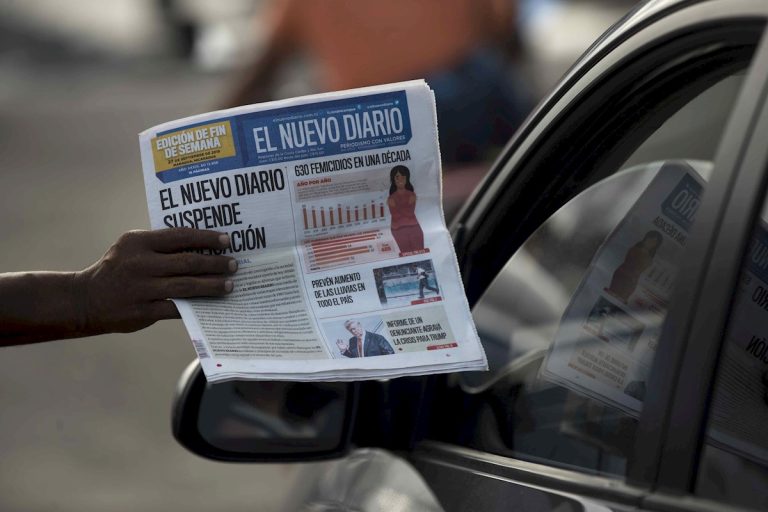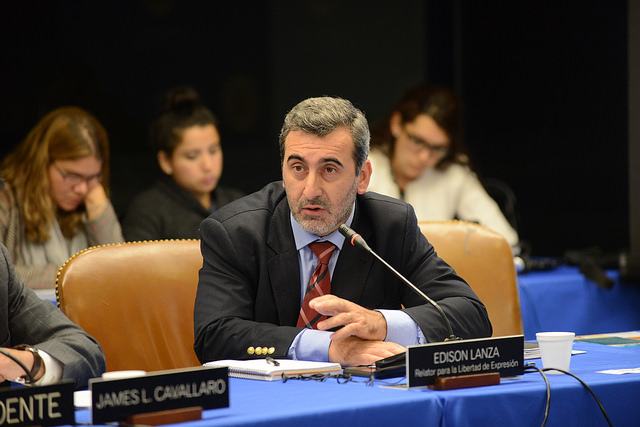29 de septiembre 2019

Children of Exile: The Births “Sowing Hope” in the Camp of Nicaraguan Farmers

PUBLICIDAD 1M
PUBLICIDAD 4D
PUBLICIDAD 5D
There is an “arsenal of indirect administrative measures” to silence critical voices, denounces the Rapporteur after the closure of “El Nuevo Diario”

The closure of Nicaragua’s El Nuevo Diario newspaper alarmed the Office of the Special Rapporteur for Freedom of Expression of the ICHR
The closure of Nicaragua’s El Nuevo Diario newspaper alarmed the Office of the Special Rapporteur for Freedom of Expression of the Inter-American Commission on Human Rights (IACHR). “We are really shocked,” says Edison Lanza.
Lanza listened this past week to a group of Nicaraguan journalists present the situation of freedom of the press and expression at the IACHR hearings in Washington. He warned that after the frontal repression against journalists and publications, the Ortega government has started using “subtler mechanisms to suffocate the media.”
“We are beginning to receive information from inspections of the Ministry of Labor, obstacles that turn into slow procedures needed by some media to receive access to funds, or even for some projects,” warned Lanza in an interview with Confidencial. The rapporteur warns of an “arsenal of indirect administrative measures” to silence critical publications.
“El Nuevo Diario” announced its closure, after 15 months of a customs embargo, how does the Office of the Special Rapporteur see this situation?
Edison Lanza: We are really shocked by the consequences of these repressive policies. After the pattern of arbitrary detentions, occupation and subtraction of equipment from media outlets, such as Confidencial and 100% Noticias, we continue to see the restrictions on access to paper, ink and the fundamental elements so that a newspaper can be printed and in circulation.
Obviously they also have to sell advertising, which is the sustainable part of a print media. We express our solidarity with the media directors, and above all with the journalists and workers of El Nuevo Diario who are today on the street because of this situation. This blow to freedom of expression is largely a product of this asphyxiation mechanism.
Have you seen anything similar in Latin America? What risks do these mechanisms represent to censor media?
Two things. The precedent is clearly what happened for years in Venezuela. As a result, a large number of media outlets, many historical, closed in Venezuela. There is one of the examples taken by the Ortega government. Obviously, at other historical times there have been other indirect mechanisms…the discrimination of state advertising in different countries is another thing, but what we want to draw attention to at this time, and put on an alert, is that the Ortega regime is beginning to apply more subtle mechanisms to asphyxiate the media.
La Prensa is experiencing the same [as El Nuevo Diario]: the lack of paper for more than a year. They keep it impounded in customs, delivering only very small quotas. We are also beginning to receive information of inspections by the Ministry of Labor, obstacles in procedures that some media need to receive access to financing, or even for some projects. Precisely this Thursday other media were telling me that these are furtive ways, but that they are no accident. Therefore, we may have entered such a phase.

Edison Lanza, Special Rapporteur for Freedom of Expression of the Inter-American Commission on Human Rights (IACHR)
How do you see the evolution of this policy of the Government against the media? Is there anything comparable?
Clearly, Nicaragua is placed in a small group of countries, especially with Cuba and Venezuela, where the restrictions to practice independent journalism are extreme. You have to be a hero or willing to bear consequences of all kinds: violence, threats, economic impact, arbitrary arrests, expropriation, and so on. There may be different modalities, but the goal is the same: to suppress any critical voice. In that sense, these three situations are the most similar in terms of suppressing freedoms.
In Nicaragua, the expropriated media outlets have not been returned, the harassment continues, either by the police or individuals who threaten in different ways: armed mobs appear in front of journalists, [threatening] graffiti and now all sorts of arsenals of indirect administrative measures or indirect pressure.
Has your office been able to raise these concerns with representatives of the Government? Have you received an answer?
Well, these hearings that are taking place here in Washington could have been an opportunity to demonstrate willingness to face the complaints, and to foster dialogue. Because that is what hearings are for. But the Government did not show up. Not even through their representatives here at the OAS. On the other hand, the IACHR is monitoring this situation through a monitoring mechanism. Journalists and the media are included, and no answers have been provided. We keep the political organs of the OAS informed of this, those who are trying to carry out a dialogue.
What does this absence of the Government say?
After a period of such hard repression, a clear IACHR intervention, a visit by the Office of the UN High Commissioner, and countries in the context of the OAS trying to push a change within a negotiation period of 75 days, it is disappointing that these situations are wasted. While they get rid of the few independent media outlets, or others are obliged to broadcast from exile in very difficult conditions, such as the case of Confidencial or the programs of Carlos F. Chamorro. Disappointment because we do not see the change in government strategy nor the willingness to move forward on issues that involve the rapporteur’s office, which is freedom of expression.
Archivado como:
PUBLICIDAD 3M
Periodista. Destaca en cobertura a violaciones de derechos humanos: desplazamiento forzado, tráfico ilegal en territorios indígenas, medio ambiente, conflictos mineros y ejecuciones extrajudiciales. Premio Iberoamericano Rey de España 2018.
PUBLICIDAD 3D